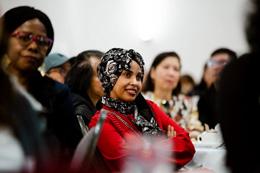BC boosts funding to assist newcomers

By Radha Agarwal
New Canadian Media
The B.C. government is more than quadrupling funding for newcomer services from $6 million to $25.6 million per year, partnering with 30 organizations throughout the province.
The increased funding, announced in March, is divided between two programs: $12.2 million for the Safe Haven program, which serves refugee claimants and asylum seekers, and $13.4 million for the B.C. Newcomers program, which focuses on work and study permit holders, provincial nominees and entrepreneur immigration candidates, among others.
Combined, the programs are expected to serve more than 40,000 people per year, up from 26,000 in 2021-22, the province says.
B.C. has also significantly expanded its multilingual support for immigrants from diverse backgrounds, now offering services in over 220 languages through trained interpreters.
Meheret Basrit, the senior manager of community development at Surrey-based charity DIVERSEcity, which is leading the Safe Haven program in the Lower Mainland, said she is excited about changes to mental health supports. Under the new programs, Ukrainians fleeing war, as well as regular visa holders and refugees, will be eligible for clinical counselling.
“Because historically, refugee claimants face extra barriers and more vulnerabilities in their claim process, there’s a huge impact on their mental health. They come from a history of war trauma or had to flee their country,” Basrit said.
“Once they land here, they face a lot of financial constraints, access to employment, and sometimes they also face exploitation.”
Jen Romero, a program coordinator at Archway Community Service, echoed Basrit’s comments, saying the new programs will allow them to provide counselling to more people. She said their clients come from many different language backgrounds and it’s important to provide them with help in their first language.
Beyond mental health support, Basrit said Safe Haven will address challenges with settlement and integration, finding jobs and formal language learning. It is also introducing a new housing search and coordination service, which will assist newcomers with everything from emergency hotel stays to long-term subsidized housing options.
Basrit said anyone who has been in Canada for 60 days or less will be entitled to emergency accommodation for up to four days. It’s an improvement, but Romero said it’s far from the ideal situation. Given the current housing crisis, most newcomers struggle to find housing quickly and Romera said many end up in emergency shelters while they search.
“…they’re not culturally appropriate or, when they are, it can be very traumatizing and triggering for folks coming in from difficult backgrounds to stay in environments like that.”
It can also take time for newcomers to find work and start making an income, which poses another challenge to finding long-term housing, Romera said.
Another major challenge people face is in accessing health care. Under Safe Haven, DIVERSEcity will be helping claimants with navigating the interim federal health program and finding clinics and family doctors.
“These enhanced services are very critical and will help address the existing service gaps,” Basrit said.
DIVERSEcity has also partnered with eight organizations to help facilitate daily cultural activities. Basrit said clients feel far safer when they get to interact with somebody who is already familiar with the culture and context of where they came from.
The charity is further bringing on an LGBTQ-focused community navigator, a women-focused resource worker and a legal navigator to help with refugee claims.
“The intention of this is to really leverage the expertise of our community partners and to make sure that we have a wide reach within the community,” Basrit said.
The B.C. Newcomers program is a reworking of a program formerly known as B.C. Settlement and Integration Services. Under its new name, B.C. Newcomers will provide enhanced services focused on getting newcomers into the job market.
It also helps people make new friends and guides them of local cultures and customs, Basrit said.
She and Romera both said the increase in annual funding comes at a vital time.
“The trend has been that our communities have been receiving higher and higher numbers all the time of refugee claimants,” Romera said.
A recent report prepared by BC Stats shows that British Columbia’s population growth rate has surged over the past three years due to higher national immigration targets. Nearly 150,800 migrants came to the province in 2022, roughly 52,000 of whom were permanent immigrants. In 2023 the population of BC experienced an annual growth rate above 3%, marking the highest annual increase since the 1970s.
The report shows that BC’s natural population growth rate has been in steady decline since 2009. In 2021 BC’s mortality rate exceeded its fertility rate for the first time, leading to a negative natural population growth rate. As with Canada as a whole, BC’s population is also getting older. As of 2022, the average age of the people living in BC was 42.3 years old, higher than the national average of 41.7 years.
In 2023, Canada accepted 37,222 refugees up from 28,272 in the year prior, as reported by IRCC.
According to the provincial government, there were 6,740 refugee claims made between January and November 2023 in B.C., a significant increase from the 3,895 claims made during those same months in 2022. Over half of the claims were made by people from Iran, Mexico, and Afghanistan.
The UN Refugee Agency says 108.4 million people were forcibly displaced worldwide in 2022 as a result of persecution, conflict, violence, climate impacts, human rights violations and events seriously disturbing public order.
Radha Agarwal is a Vancouver-based New Canadian Media correspondent currently on a work experience placement with Black Press Media. This article was originally published on Today In BC.






